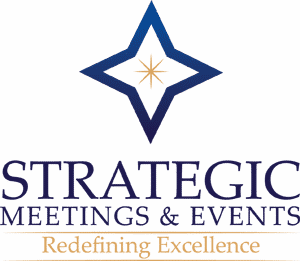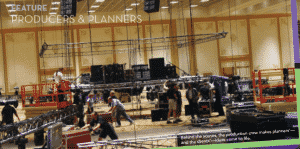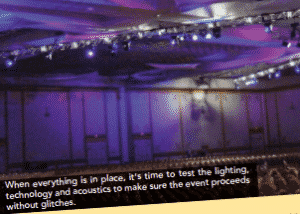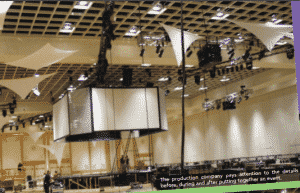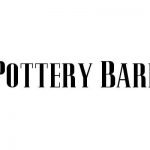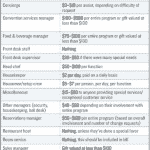Teaming Up for Great Events – A Guide to Working with Event Producers
By Christy Lamagna, CMP, CMM, CTSM
 Some planners focus only on what goes on outside the ballroom; if it plugs in or lights up, we don’t want to know about it. True, planners have plenty of details to tend to without worrying about the intricacies of what goes into producing a general session, but it’s important to have basic knowledge for great events of what your production team is doing on the other side of the ballroom doors and how you can be a partner to them.
Some planners focus only on what goes on outside the ballroom; if it plugs in or lights up, we don’t want to know about it. True, planners have plenty of details to tend to without worrying about the intricacies of what goes into producing a general session, but it’s important to have basic knowledge for great events of what your production team is doing on the other side of the ballroom doors and how you can be a partner to them.
As planners, we are most comfortable when we are in control of everything and things that don’t fit that category are things we avoid. Production often falls into that category. Here’s the good news: if you learn some basics, you can overcome your aversion to what goes on behind the ballroom doors in achieving great events.
■ Ask your production team to walk you through the basics: What’s the difference between rear and front screen projection? Why should you use one over the other? What are the advantages, the disadvantages and the cost implications of each?
■ Take someone from your production company on your site visit. You’d be amazed at their attention to detail on things planners often pay no attention to: width of doors, push distance (the distance from the freight elevator to the ballroom), where the electrical box is in the ballroom, loading dock hours and more. It’s fascinating to watch producers work magic with a laser tape measure and a room diagram and it will allow planners to make a better decision about which meeting space is right for the event. Ask now, save money later.
■ Find out how much time is needed for load in, strike and technical rehearsals before negotiating your contract, in order to correctly schedule when you pickup and drop your ballroom and meeting rooms. If you don’t schedule enough time for the crew to load in and do a technical rehearsal before your speakers arrive or you force an overnight load-in with a show the next morning, you pay overtime and your crew is exhausted before the show even begins. These are the guys who make the magic happen. They need their rest. Ask your production lead to guide you on what is needed.
■ Make sure your speakers have their presentations completed and submitted with plenty of time to load them into the show computer—and make sure they rehearse! It’s important for even seasoned speakers to walk the stage, see where your confidence monitors are placed and get comfortable with the room. This also allows the production team to get voice levels, see how the presenter is on stage and be ready to follow him/her throughout the presentation.
■ Understand PowerPoint slides: if your speakers have video embedded into their presentations and are not using a laptop to present, the video file must be saved separately. It appears that the video is embedded in the PowerPoint but it’s not. This is a painful lesson to learn.
■ Include your production team in the planning process. Let the production team know about your event’s goal, theme and audience. They are your partners in creativity and can help you turn your concepts into reality.
■ Use lighting as décor. Nothing changes the look and feel of a room like light. Let your production team work with you to create a mood for each event you have in the ballroom. Gobos are great ways to brand inexpensively and can be used again and again. The options that you have at your disposal for lighting are fun, endless and often well within your budget.
■ Find out from your potential venue if it is a union hotel or if using in-house AV is a requirement. Either scenario can put your budget into a tailspin. Often with union hotels, you can bring in your own production crew but have to pay for union labor on top of the crew you provide. Get a clear understanding of overtime, meal requirements and union to non-union labor ratio. Once the contract is signed, there is no negotiating.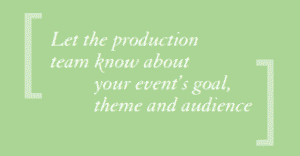
■ Have the production company prepare a letter to the venue listing all requirements. This will include the time the truck will be at the loading docks and when, power requirements, estimated time for load-in and strike, security requirements and more.
■ Make sure the crew is dressed appropriately for the show. If you want your stage manager and technical director in suits on the day of the show, let them know. If you want them in staff shirts, put them in the count when ordering. Often they are overlooked when ordering show uniforms.
Finding the right production company for great events
Now that you know a bit more about to work with a production company, how do you find the right one? It’s hard to evaluate someone if you don’t know how to do their job, but knowing what questions to ask goes a long way in creating great events.
■ Ask planners who produce similar programs which companies they use. Referrals go a long way for all parties involved and can reduce the amount of time you spend vetting unknown companies.
■ Review the company’s portfolio. If the website has photos of weddings and large parties and you’re producing corporate general sessions, it likely isn’t a good fit.
■ Ask for references from a client who does events similar to what you’re bidding out. If you’re a not-for-profit and they are sending you blue chip client references, you may not be looking at the right company.
■ Ask for names of venues or hotels they recently worked in. Checking with the facility may tell you that this company was efficient and a pleasure to work with—or they may tell you that they were slow, messy and caused damage to the property.
■ Listen to the questions the production company team asks. You learn when you’re listening. See what they are interested in: If they ask you about your company, your executives, your goals, past challenges and what your priorities are, that’s a great start and key for great events.
Go to an event they’re producing that is similar to the event you need produced. See what the feeling in the ballroom is, if doors open on time, how the production runs and how the lead planner on the program feels about the company’s performance. References are great; a live interview is better.
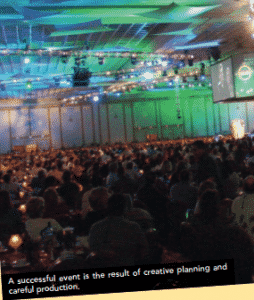 ■ Get a sample budget for the event you saw or an event they show you from their portfolio. Falling in love with a stage set and lighting design only to find out you can’t afford it is a waste of time and energy.
■ Get a sample budget for the event you saw or an event they show you from their portfolio. Falling in love with a stage set and lighting design only to find out you can’t afford it is a waste of time and energy.
■ Be honest with your production point person and ask questions. You don’t know what you don’t know, so get educated. Ask if there is something you are overlooking or if they have any suggestions for you. My favorite is, “Is there something I should have asked that I didn’t?” It yields useful and interesting replies. People appreciate being asked their opinion.
■ Ask your potential new vendor about a show they produced that they are very proud of—and why. The answer may be insightful.
■ Trust your instincts. It’s all about relationships; make sure that the production company you choose fits your company or organization’s culture, not just your budget. The planning process is a long one and having the right people on the team is an essential component to a successful show. If you have a good rapport with your new vendor, it will make for great events and a much easier process.
One other thing: Great events require great production. The crew works tirelessly behind the scenes and is often an afterthought. You don’t see those who are literally behind the curtains. Make sure you schedule coffee and a hot breakfast for them, feed them something warm for lunch and set dinner for them if they are working into the night. Be aware of the hours they are keeping and allow room in your budget for a second shift, if necessary. These are the people responsible for making sure your show flows smoothly, so give them the same consideration you do to the other members of your team. The production crew is often the unsung hero of a show. Great events require great production. Make those hardworking folks a priority and the benefits will be tenfold.
Tags: Teaming Up For Great Events, Great Events, Event Planning, Strategic Events, Strategic Planners, Event Planners, Corporate Meetings, Corporate Events, Strategic Events, Event Solutions
